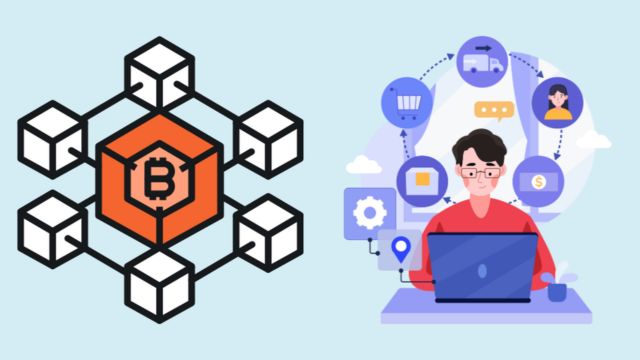Originally embraced by cryptocurrencies such as Bitcoin, blockchain technology has developed much beyond its intended use. Blockchain is transforming the way governments and companies run as it promises decentralisation, openness, and security. It is being used in many sectors currently. This paper investigates how blockchain is being used in several fields and its ability to challenge established processes, therefore providing many advantages to companies and people both.
What is Blockchain?
Fundamentally, blockchain is a distributed ledger system (DLT) kept across a computer network. Stored in blocks, each connected to the one before it forms a chain from the data. Data’s decentralisation guarantees that no one entity holds the information, so enhancing security, openness, and decreased likelihood of manipulation. Blockchain is quite dependable since its immutability guarantees that once data is entered, it cannot be changed without the agreement of most.
1. Blockchain in Financial Services: Revolutionizing Banking and Payments

The financial services industry has one of the most significant blockchain deployments under use. Many times slow, costly, and rife with middlemen, traditional banking systems But blockchain presents a distributed and open substitute that might cut expenses and expedite procedures.
- Cross-Border Payments: Blockchain enables near-instantaneous cross-border payments at a fraction of the cost. By eliminating intermediaries like banks and clearinghouses, transactions can be completed in real-time with lower fees.
- Cryptocurrencies: Cryptocurrencies like Bitcoin and Ethereum are built on blockchain technology. These digital currencies offer decentralized alternatives to traditional currencies and are gaining mainstream adoption as investment assets and means of transaction.
- Smart Contracts: Blockchain’s smart contracts allow for self-executing agreements without the need for intermediaries. These contracts automatically execute and enforce terms once predefined conditions are met, reducing the risk of fraud and human error.
2. Blockchain in Supply Chain Management: Enhancing Transparency and Efficiency
Supply chains are complex, involving multiple parties, from manufacturers to distributors to retailers. Blockchain provides a transparent, immutable record of each step in the supply chain, improving traceability and reducing fraud.
- Tracking Goods: Blockchain can be used to track goods from production to final delivery, providing real-time data on the location, condition, and ownership of products. For example, food supply chains can use blockchain to ensure the freshness and safety of products by verifying the authenticity of certifications and preventing food fraud.
- Reducing Counterfeiting: Counterfeit products are a major issue in industries such as pharmaceuticals and luxury goods. Blockchain’s ability to create an immutable record of every transaction in the supply chain can help eliminate counterfeit products by providing verifiable proof of authenticity.
- Efficiency Gains: Blockchain can automate many supply chain processes through the use of smart contracts, reducing delays and improving operational efficiency.
3. Blockchain in Healthcare: Improving Data Security and Interoperability
The healthcare industry is increasingly turning to blockchain to address issues related to data security, privacy, and interoperability.
- Medical Records: Blockchain can create a secure and immutable record of patient medical histories, which can be easily accessed by authorized healthcare providers. This ensures that sensitive medical data is protected from cyberattacks while being readily available to improve patient care.
- Drug Traceability: Blockchain helps in the traceability of pharmaceuticals, ensuring that drugs are not counterfeit and are being stored and distributed properly. This helps prevent the distribution of dangerous or substandard drugs, which is a significant problem in many countries.
- Data Sharing: Blockchain enables secure sharing of healthcare data across institutions and systems, making it easier to provide comprehensive care. Since blockchain maintains an immutable record, it helps ensure that data cannot be tampered with, offering greater trust and accountability.
4. Blockchain in Voting: Enhancing Security and Transparency in Elections
Elections around the world face challenges related to security, fraud, and voter trust. Blockchain offers a solution by providing an immutable and transparent platform for voting.
- Securing Elections: Blockchain can be used to create a decentralized voting system, where each vote is recorded on the blockchain and cannot be altered or deleted. This ensures that election results are accurate and tamper-proof, reducing the potential for fraud.
- Remote Voting: With blockchain, voting can be done securely over the internet, enabling greater participation. This could be especially important in areas with significant travel or accessibility challenges, ensuring that more citizens can participate in elections.
- Transparency: Since blockchain provides an open and immutable record of votes, all stakeholders can verify the election process, increasing voter confidence in the system.
5. Blockchain in Digital Identity: Empowering Individuals
Managing personal identities securely has grown more difficult in a society going more digital. Blockchain lets people securely and dispersedly manage their own digital identities.
- Self-Sovereign Identity: Blockchain enables individuals to own and control their digital identity, including personal details such as name, address, and date of birth. Rather than relying on centralized authorities, individuals can share specific pieces of their identity when needed, ensuring privacy and security.
- Reducing Identity Theft: Since blockchain offers a secure and immutable record, it can significantly reduce the risk of identity theft. Personal data stored on the blockchain is protected by cryptographic techniques, making it difficult for hackers to alter or steal.
Challenges and the Road Ahead
Though blockchain has great promise, some issues still exist. Scalability is a major problem since blockchain systems find it difficult to handle fast processing of big amounts of transactions. Furthermore there is regulatory ambiguity since governments and regulatory authorities all around struggle with how to control blockchain technologies, especially in the financial industry.
But as blockchain technologies develop sharding and layer-2 solutions help to solve scalability issues. Blockchain is predicted to be applied in many more industries as regulatory systems change and grow more developed.
Conclusion:
Clearly among the most revolutionary technologies of the modern era is blockchain. From finance and supply chains to healthcare and voting systems, its capacity to improve openness, security, and efficiency is transforming sectors including Blockchain technology will probably be essential in determining the course of the global economy as it develops since it makes systems more distributed, open, and available for all and helps them to be more decentralised.
Understanding the several uses of blockchain helps companies and people to be ready for a day when this creative technology will be absolutely important in daily life.
Unlock the power of technology with Digital India MIB! Stay ahead with the latest tech innovations, government initiatives, and digital trends. Explore our insights and resources to harness the potential of the digital world. Visit us now and be a part of India’s digital transformation!
